ARS scientists conducted research to determine if America’s agricultural system is safe from COVID-19.
Search Articles
-
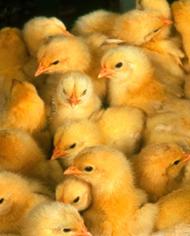
ARS scientists conducted research to determine if America’s agricultural system is safe from COVID-19.
Mar 11, 2022 -

ARS scientists conducted research to determine if America’s agricultural system is safe from COVID-19.
Mar 10, 2022 -

ARS researchers and the USDA Southwest Climate Hub developed a new set of tools aiming at helping farmers, ranchers, and other stakeholders plan for serious environmental challenges.
Mar 02, 2022 -
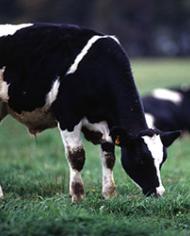
Grass-Cast uses historical data about weather and vegetation growth to predict how much grass will be available for livestock grazing during the upcoming summer.
May 24, 2019 -

ARS researchers collaborated with scientists from the University of Florida to develop a simpler method to sterilize mosquitoes.
May 03, 2022 -
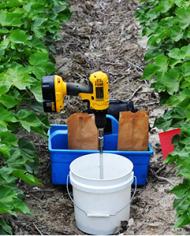
Researchers have developed a new, easier way to find the answer to the question, "How much carbon is stored in soil?"
Mar 14, 2022 -
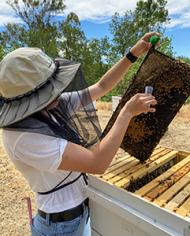
A long-term honey bee monitoring network helps researchers to better understand colony performance and survivorship over multiple seasons.
Apr 19, 2022 -
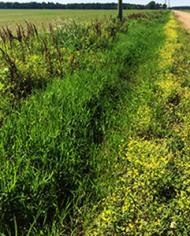
ARS researchers found that keeping plants in drainage ditches can benefit the aquatic ecosystem
May 02, 2022 -
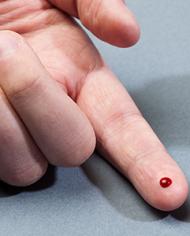
Research at the ARS Western Human Nutrition Research Center revealed that consuming a new type of wheat may help control blood sugar.
Apr 13, 2022 -
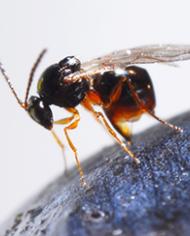
ARS and University of California-Berkeley scientists are evaluating the potential of a parasitoid wasp to control the fruit fly, spotted wing drosophila.
Apr 12, 2022 -
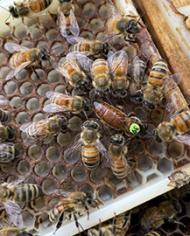
ARS researchers are studying genetics and breeding to make honey bees more resilient.
Apr 06, 2022 -

Highlighting the achievements of Steven Kappes, Moon Kim, Autar Mattoo, Steven Mirsky, Sherry Hunt, William Hart-Cooper, Amy Vincent, Hyun Lillehoj and Marilyn Warburton.
Apr 05, 2022 -
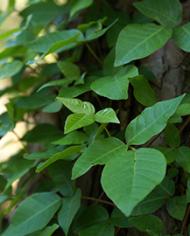
Scientists have developed and are testing a derivative of urushiol that could help desensitize the skin of individuals susceptible to poison ivy dermatitis.
Mar 15, 2022 -
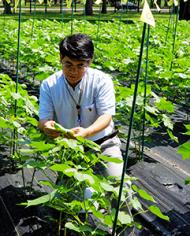
Scientists are producing new strains of cotton that offer both quality and abundance.
Mar 14, 2022 -

ARS-funded researchers investigated how the content of oligosaccharides differed in milk produced by women with normal weight, overweight, or obesity.
Mar 14, 2022 -
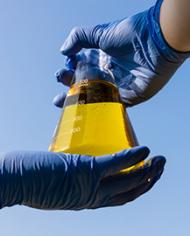
ARS scientists are investigating ways to ensure agriculture can produce renewable fuels that will help diminish our carbon footprint.
Mar 14, 2022 -
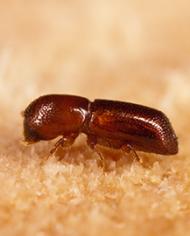
ARS scientists are combatting pests and diseases affecting avocado production in the U.S.
Mar 14, 2022 -
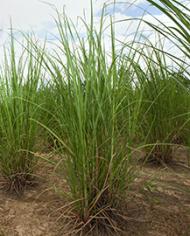
Scientists conducted research on how farm management practices could maximize elephant grass’s utility as a bioethanol feedstock.
Mar 10, 2022 -
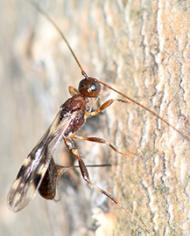
In the search for natural enemies of the emerald ash borer, one promising candidate is a tiny 5-7 millimeter-long parasitic wasp that lays its eggs on EAB larvae.
Mar 10, 2022 -
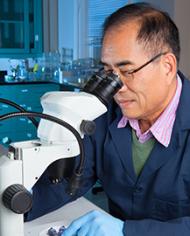
ARS scientists found that methyl benzoate can repel, and even kill, other insects and pests, including the spotted wing drosophila fly.
Mar 09, 2022 -
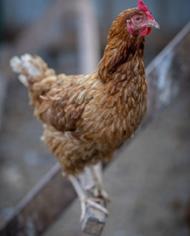
ARS researchers in Temple, TX, employed adaptive nutrient management to determine preferred balances on farms.
Mar 08, 2022 -

A stabilizer created using corn starch and vegetable oil opens the door to all sorts of useful food-grade and industrial applications.
Mar 07, 2022 -

ARS researchers used computer modeling to predict the limited potential of livestock transmission of SARS-CoV-2.
Mar 04, 2022 -
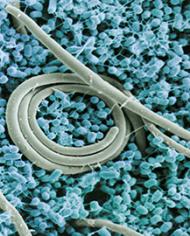
ARS scientists in collaboration with researchers at the University of Georgia, developed a series of algorithms capable of effectively predicting the prevalence of Salmonella.
Mar 03, 2022 -
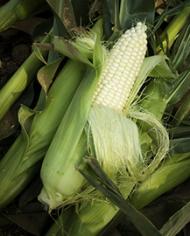
A team of researchers and their partners have found another way to conserve water: late planted corn.
Mar 03, 2022 -
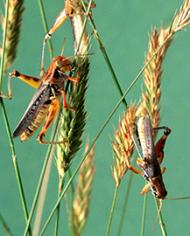
Often viewed as pests, grasshoppers may have a larger environmental role to play.
Mar 02, 2022 -
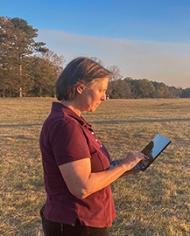
ARS researchers have developed a unique mobile system that assesses and maps out soil carbon to a depth of 30 centimeters (the plow layer) – all in real time.
Mar 01, 2022 -

ARS scientists are investigating ways to ensure agriculture can produce renewable fuels that will help diminish our carbon footprint.
Feb 28, 2022 -
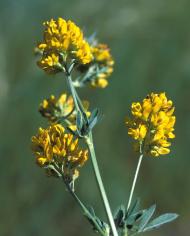
Beef producers in the western United States have been searching for alternatives to nitrogen-rich fertilizers .
Feb 28, 2022 -

ARS scientists are investigating ways to ensure agriculture can produce renewable fuels that will help diminish our carbon footprint.
Feb 28, 2022 -
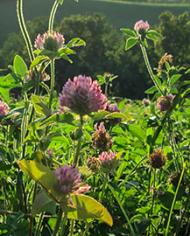
Red clover in cattle diets could give them additional defense against fescue toxicosis, caused by the consumption of fungus-infected tall fescue when grazing.
Feb 28, 2022 -
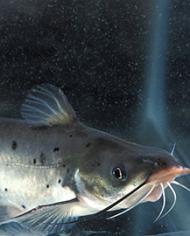
ARS researchers and Villanova University researchers looked at compounds called pyranopyrans that have significant antibacterial properties against a certain fish pathogen.
Feb 25, 2022 -
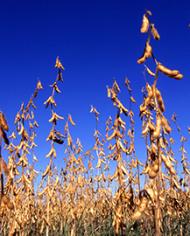
ARS scientists studied how high-oleic soybean oil--an oil with high amounts of monounsaturated fats--modifies LDL cholesterol in comparison to other oils.
Feb 25, 2022 -
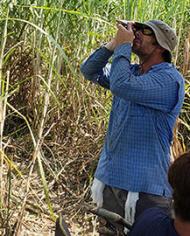
A new variety of sugarcane has high fiber content, excellent regrowth ability, high stalk population, cold tolerance, disease resistance, and excellent biomass yield.
Feb 25, 2022 -
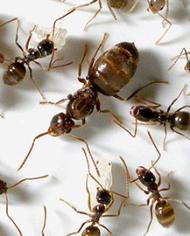
ARS scientists and the Foundation for the Study of Invasive Species in Argentina, conducted research to further understand tawny crazy ant behavior.
Feb 24, 2022 -
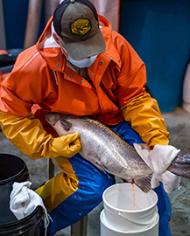
An improved genome reference sequence for the North American Atlantic salmon and the first DNA chip enables the use of genomic information in breeding strategies.
Feb 22, 2022 -

An improved genome reference sequence for the North American Atlantic salmon and the first DNA chip enables the use of genomic information in breeding strategies.
Feb 22, 2022 -
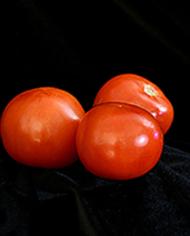
Researchers developed a cool new intervention technology involving the use of cold plasma and hydrogen peroxide aerosols.
Feb 22, 2022 -
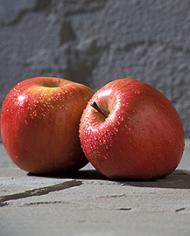
Researchers found that specific fruits and vegetables rich in plant compounds known as flavonoids may significantly reduce the risk of Alzheimer’s dementia.
Feb 17, 2022 -
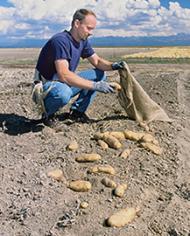
ARS scientists created a new potato variety with greater yields and better processing qualities, especially for making chips and fries.
Feb 16, 2022 -
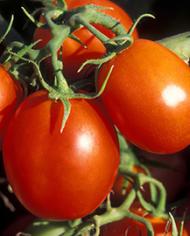
Combining the biofumigant with an herbicide seems to curb infestations of purple nutsedge as well as reduce nematodes and the tomato wilt bacterium.
Feb 14, 2022 -
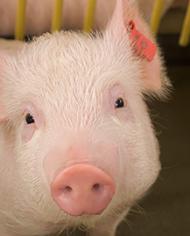
ARS scientists at the Plum Island National Animal Disease Research Center are preparing countermeasures in case of the arrival of African Swine Fever in the United States.
Feb 14, 2022 -
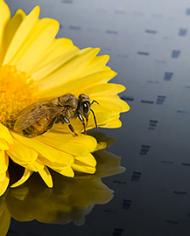
Researchers with the ARS Honey Bee Breeding, Genetics, and Physiology Research Unit have identified a region of the honey bee genome linked to reduced colony defensiveness.
Feb 11, 2022 -
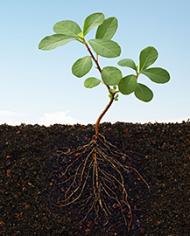
A new protocol addresses sources of variability and uncertainty in measuring microbial community composition and its connection with agricultural management and changing climate.
Feb 10, 2022 -
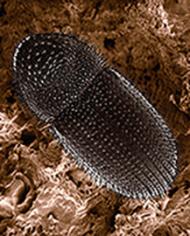
ARS scientists studied Puerto Rican fungal strains as possible biological control agents for managing the coffee berry borer in an environmentally sustainable manner.
Jan 28, 2022 -

Scientists conducted research on how farm management practices could maximize elephant grass’s utility as a bioethanol feedstock.
Jan 28, 2022 -
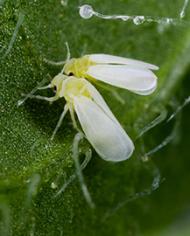
ARS scientists have developed novel RNA interference technology that interrupts the expression of critical whitefly genes.
Jul 27, 2020 -
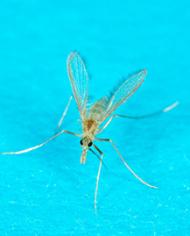
ARS researchers have developed a molecular method that could revolutionize the way we approach surveillance of sand flies.
Jul 27, 2020 -

The National Agricultural Library provides access to millions of journal articles and other publications, as well as rare books and manuscript materials in its Special Collections unit
Jul 30, 2020 -

ARS’s Office of Technology Transfer is, in essence, the bridge that connects ARS scientific technologies to homes across the Nation.
Jul 30, 2020 -
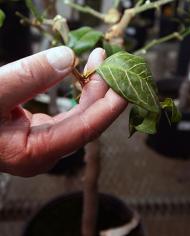
Researchers found a way to distinguish between two citrus diseases that are similar in appearance, but dangerously different.
Jul 27, 2020 -
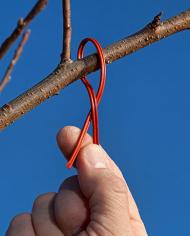
ARS researchers and their collaborator have demonstrated that an areawide mating disruption approach could control peach tree pests.
Jul 27, 2020 -
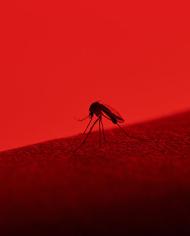
ARS scientists have developed a new test to quickly detect Zika virus in mosquitos.
Jul 27, 2020 -
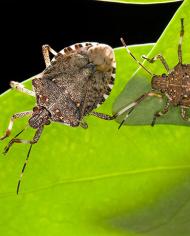
ARS scientists are looking into “attractive” ways to kill brown marmorated stink bugs.
Jul 27, 2020 -
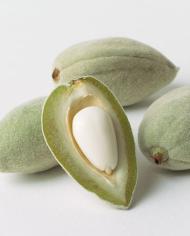
Scientists developed a effective, energy-saving technology to help keep microbes and mycotoxins off almonds.
Jul 27, 2020 -
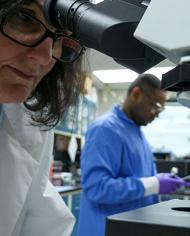
A team of researchers, including ARS scientists, is on the cusp of releasing the world's first treatment for peanut allergy.
Jul 27, 2020 -

People in their 70s and 80s can improve their mobility and function by walking 30 minutes a day.
Jul 27, 2020 -
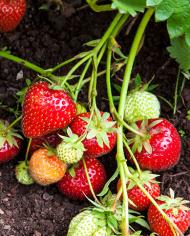
A way to control mold while keeping the strawberries fresh and tasty.
Jul 27, 2020 -
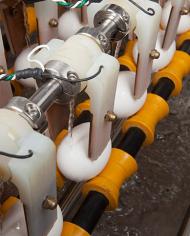
ARS scientists at the Food Safety and Intervention Technologies Laboratory have hatched a way to produce safer eggs without jeopardizing quality.
Jul 27, 2020 -
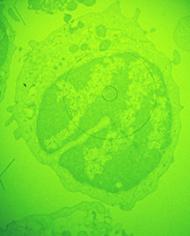
ARS scientists are using gene editing to assist in the development of a vaccine for
African swine fever.Jul 26, 2020 -

Scientists at ARS’s Children’s Nutrition Research Center in Texas may have found a breakthrough for one of the biggest health concerns in the United States.
Jul 26, 2020 -

Highlighting the achievements of Elizabeth Ainsworth, Heather Allen, Jo Anne Crouch, and Sara Lupton
Jul 24, 2020 -
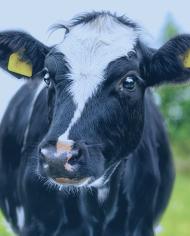
ARS researchers found that hops that are too old for brewing beer, but still nutritious for cattle, may be available for coproduct development.
Jul 24, 2020 -
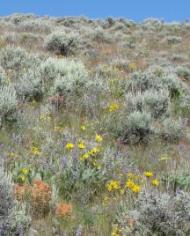
Cheatgrass outcompetes native plants for nutrients and water and deprives animals of dietary variety and quality as well as habitat.
Jul 24, 2020 -
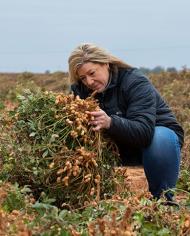
ARS scientists recently released “Contender” peanut, which is high in oleic fatty acids.
Jul 24, 2020 -
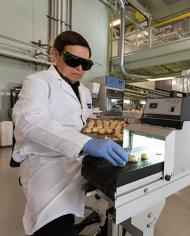
Good food going bad is a sad thing when many people are going hungry, but ARS researchers have addressed that issue.
Jul 24, 2020 -
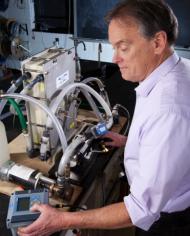
Electrodialysis may not only benefit farmers, but also the environment by reducing nitrogen runoff from farms.
Jul 24, 2020 -
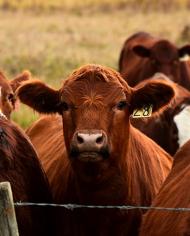
Raising beef cattle without antibiotics may not reduce levels of antimicrobial resistance.
Jul 24, 2020 -
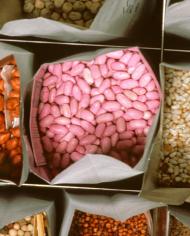
The National Plant Germplasm System--a collection of seeds, cuttings, bud wood, rootstocks, and other plant material--has had over 209,700 accessions shipped to 81 countries.
Mar 13, 2019 -

Highlighting the achievements of Soheila J. Maleki and Matthew N. Rouse.
Mar 04, 2019 -

ARS researchers are working to counter Emerald Ash borers with releases of the parasitic wasp Tetrastichus planipennisi and gene-based control.
May 24, 2019 -
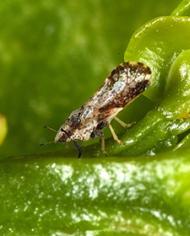
A team of ARS and Boyce Thompson Institute researchers in Ithaca, NY, may have found a weak link in the citrus-greening disease cycle.
May 09, 2019 -
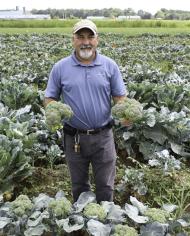
ARS researchers decided to examine the genetics that underpin broccoli's ability to cope with heat stress.
May 07, 2019 -
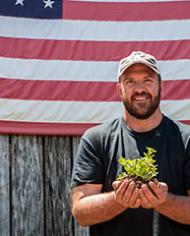
ARS scientists have teamed with the University of Arkansas to introduce veterans to the farming profession and teach them basic agricultural practices.
May 06, 2019 -
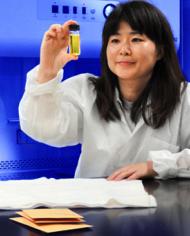
ARS researchers have created silver nanoparticles whose antimicrobial properties can be passed directly into the cotton fibers that make up fabrics and textiles.
Apr 26, 2019 -
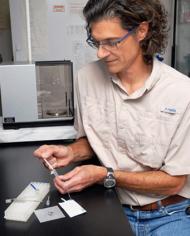
ARS researchers and APHIS colleagues developed a new test that quickly identifies red imported fire ants
Mar 29, 2019 -
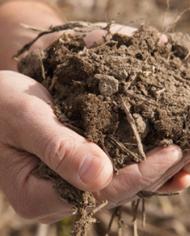
Farmers can better determine how much or how little nitrogen to apply for optimal crop yields by using "Soil-Test Biological Activity" approach.
May 28, 2019 -
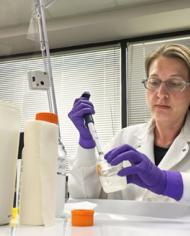
ARS researchers in New Orleans, LA, looked for an environmentally friendly, biobased alternative for cleaning cotton.
May 28, 2019 -
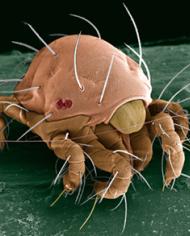
ARS Electron and Confocal Microscopy Research Unit helps expand the scientific understanding of microbes, pests, and pathogens that attack crops, infect livestock, and sicken thousands of people each year.
May 23, 2019 -

ARS researchers compared egg storage methods to verify the benefits of egg washing and refrigerated storage.
May 23, 2019 -
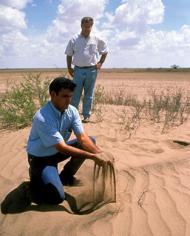
Researchers are exploring the use of robots to take on hazardous duties related to studying wind erosion of soils and the expansion of deserts.
May 22, 2019 -
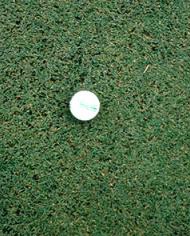
35 years of research in turfgrass breeding and genetics has improved the very surface of the earth we walk on.
May 21, 2019 -
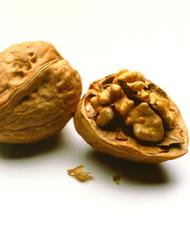
ARS physiologists found that not all those calories may be available for uptake and use by the body.
May 21, 2019 -

ARS nutrition researchers combined seven different analytical methods to resolve conflicting information about vitamin D levels needed for a healthy diet.
May 21, 2019 -
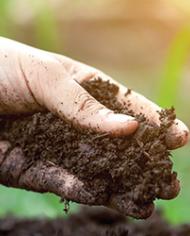
Researchers developed state-of-the-art sensors that estimate soil water levels using readings from electromagnetic pulses.
May 16, 2019 -
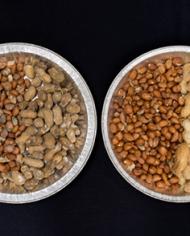
The researchers found that raising the temperature in stored peanuts solved the mold problem without affecting peanut quality.
May 15, 2019 -

ARS researchers in Oregon have bred more than 20 varieties of hops since the 1950s.
May 15, 2019 -
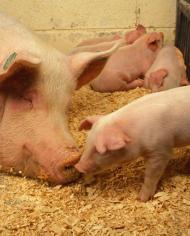
Researchers discovered the amino acid, L-glutamine shows potential to serve as a natural antibiotic alternative to promote growth and well-being in piglets.
May 10, 2019 -
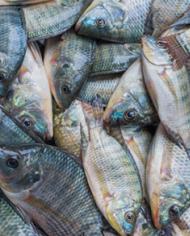
ARS researchers helped evaluate new strains of tilapia that can resist the bacteria that cause the deadly fish disease streptococcosis.
May 07, 2019 -
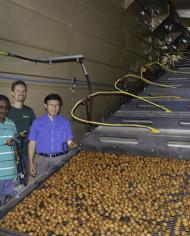
ARS researchers teamed with University of California-Davis scientists to devise a thriftier way to dry walnuts.
May 03, 2019 -
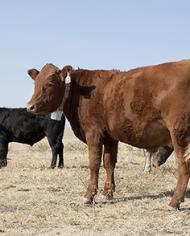
ARS researchers have fitted beef cattle with special collars to monitor their movements and behavior.
May 02, 2019 -
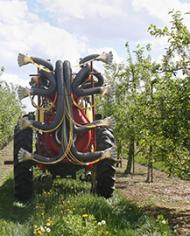
A team led by ARS scientists in Wooster, OH, developed and tested the smarter sprayer technology.
Apr 22, 2019 -
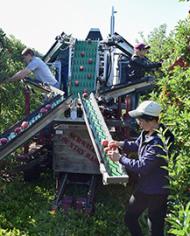
Researchers have developed a self-propelled apple-harvest and in-field-sorting prototype machine.
Apr 17, 2019 -
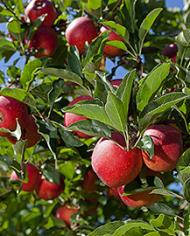
ARS scientists investigated using a robotic vision system, RoTSE, to prune fruit trees during the winter.
Apr 17, 2019 -
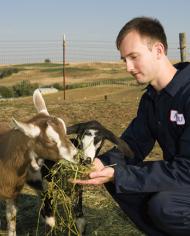
ARS researchers have been on the forefront of studies to diagnose prion diseases in vulnerable livestock.
Apr 12, 2019 -
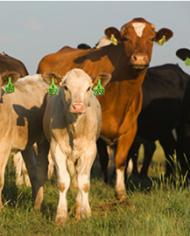
The U.S. Meat Animal Research Center provides scientific information and new technologies that can be utilized on problems affecting the beef, sheep, and swine industries.
Apr 05, 2019 -
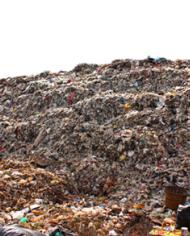
ARS scientists are exploring ways to convert household waste into methane and ethanol that can be used to power trucks or generators
Apr 05, 2019 -
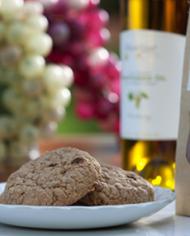
ARS chemists found the byproducts of wine-making can be made into a health-promoting flour.
Apr 02, 2019 -
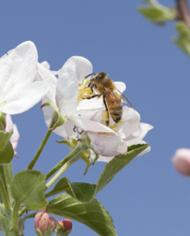
ARS researchers are focusing on the honey bee “microbiome”—the bacteria and other microbes that inhabit the insect's gut.
Mar 04, 2019 -
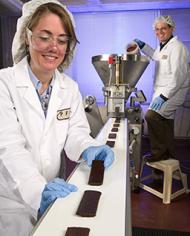
An ARS team devised a two-step system that dries fruits and vegetables using 75 percent less energy than traditional methods.
Mar 04, 2019 -

ARS researchers have been on the forefront of studies to diagnose prion diseases in vulnerable livestock.
Feb 15, 2019


